Chicken tikka masala is a dish that wraps comfort and amazing spices all into one, making it a surefire hit for your next family dinner. Imagine tender chunks of chicken bathed in a creamy, spiced tomato sauce—yes, it’s as delicious as it sounds. Whether you’re a seasoned chef or just starting to explore the kitchen, this dish is a delightful journey for your taste buds and a wonderful way to bring a piece of South Asian cuisine into your home. So, let’s dive in and spice up tonight’s dinner with some chicken tikka masala magic!
This recipe is absolutely fantastic with homemade Garam Masala. If you love chicken tikka masala you’re also going to love butter chicken!
Why You’ll Love This Recipe
- Rich and creamy sauce that’s a guaranteed crowd-pleaser.
- Protein is easily customizable for meat-eaters and plant-based diets.
- Spice level is easily adaptable for mild to spicy palates.
- Leftovers taste even better the next day.
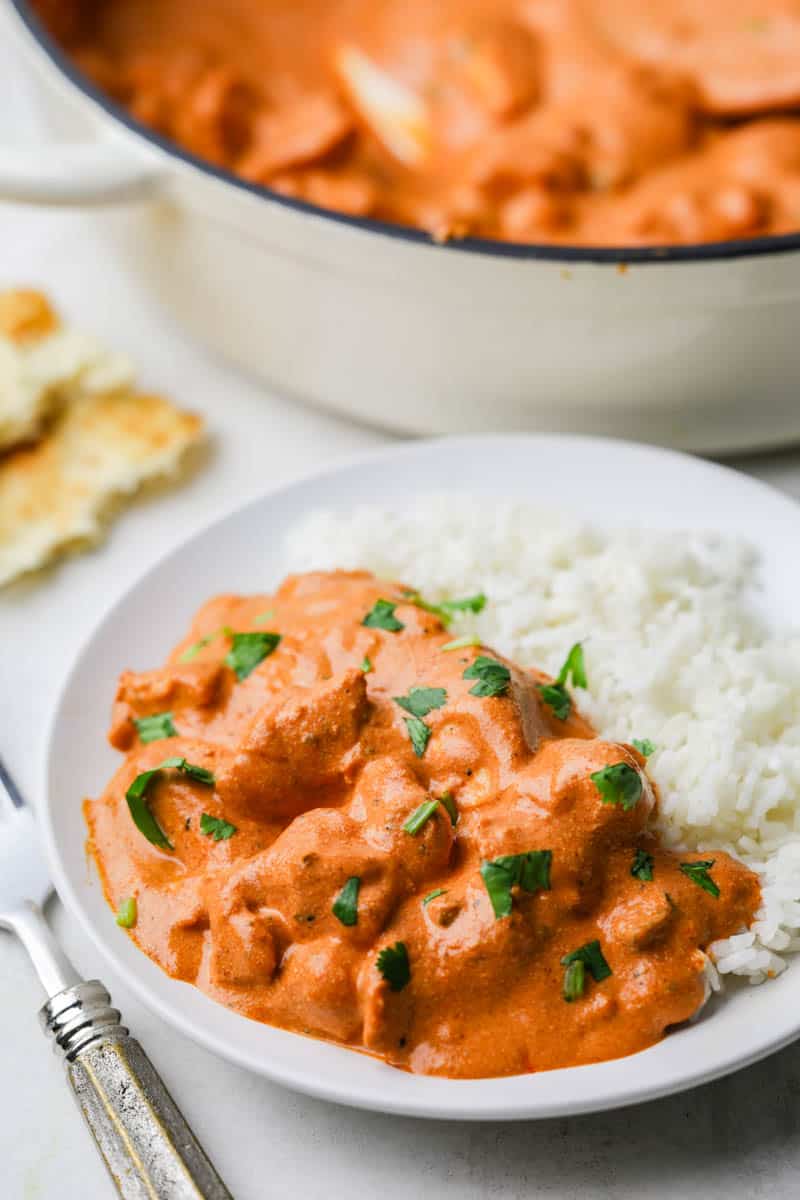
Chicken Tikka Masala Recipe Ingredients & Substitutions
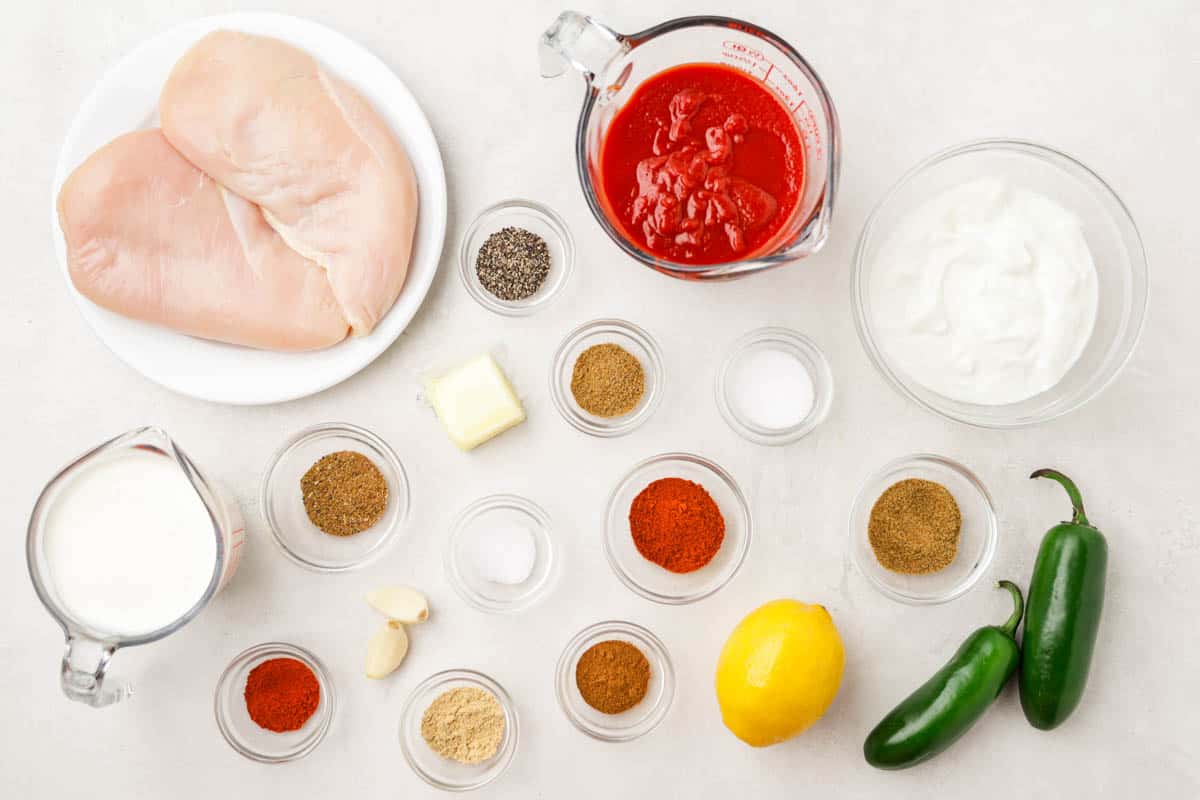
- Chicken: Lean and protein-rich, it’s the core of the dish. For our plant-based readers, you can use paneer, fried tofu, chickpeas, or mixed veggies in place of the chicken. If using paneer, cut it into bite-sized cubes and toast in some cooking oil or butter until browned before continuing with making the sauce.
- Greek Yogurt: Adds tenderness to the chicken and creaminess to the sauce. Sour cream or a plant-based yogurt are suitable alternatives.
- Tomato Sauce: The base of the sauce, providing tang and color.
- Heavy Whipping Cream: Brings richness and balances the spices. Full-fat canned cashew or coconut milk are fantastic dairy-free options.
- Butter: Adds flavor while sautéing; can be replaced with ghee or oil.
- Cumin: Earthy and slightly bitter, it adds depth.
- Cayenne Pepper: Offers heat; adjust according to your spice tolerance.
- Garam Masala: A blend of ground spices, it gives a warm and aromatic flavor.
- Cilantro: Fresh is always best, but you may use 4 teaspoons dried cilantro if needed. If cilantro isn’t to your liking or if you’re among those who taste it as soapy, fresh flat-leaf parsley is an excellent alternative.
Using substitutions – especially low-fat substitutions – may affect final taste and texture.
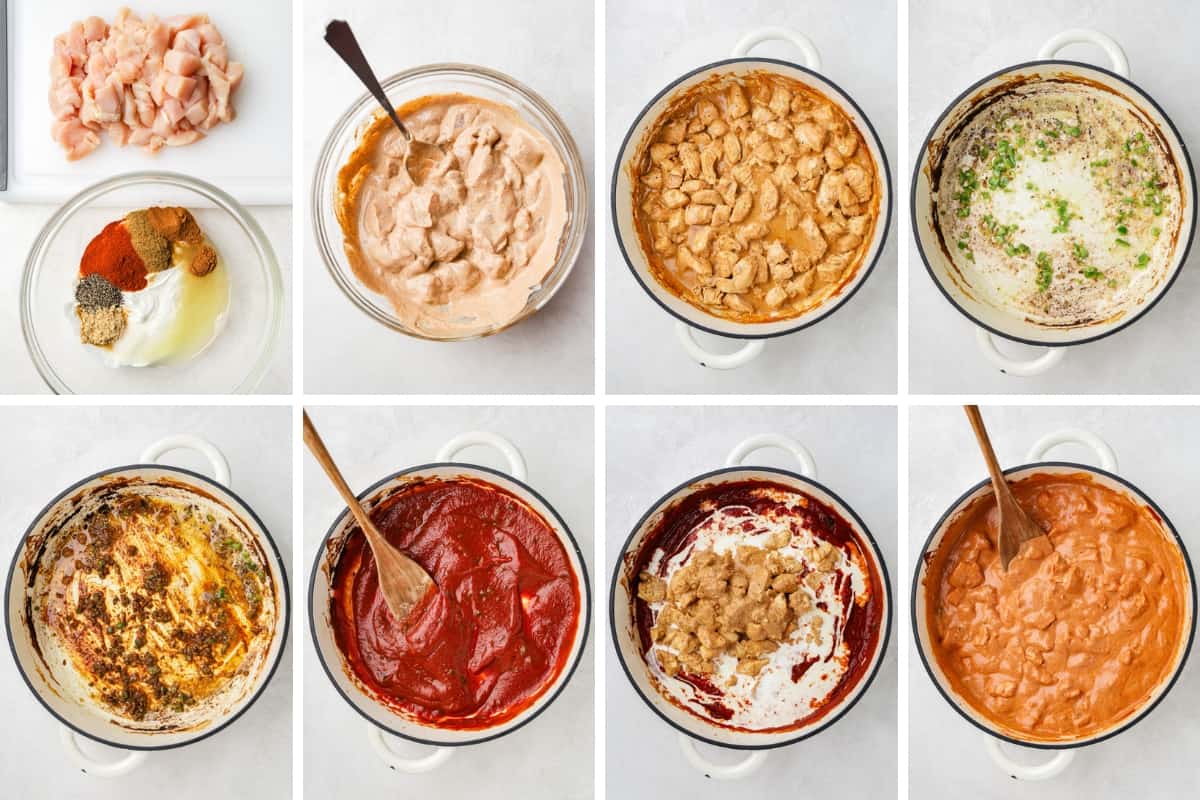
History of Chicken Tikka Masala
Chicken tikka masala holds a unique place in culinary history. While its roots trace back to the Indian subcontinent, the dish as we know it today is believed to have evolved in Britain, where chefs combined roasted chicken (tikka) with a creamy tomato sauce (masala). It’s a testament to how food bridges cultures, as this fusion dish resonates both with the Indian diaspora and the British populace. Beyond its taste, chicken tikka masala signifies the beauty of culinary evolution and the blending of different food traditions.
Can I cook the chicken on the grill?
Certainly! Thread the chicken onto skewers, and grill over high heat, rotating every 2 to 3 minutes, until the chicken reaches an internal temperature of 165 degrees Fahrenheit.
If using wooden skewers, be sure to soak them in water for 30 minutes before using so they don’t catch fire.
Spice Level Adjustments
The beauty of chicken tikka masala is its adaptability. If you prefer a milder version, reduce the quantity of cayenne pepper or jalapeño. Alternatively, for an added kick, consider adding a touch of extra chili powder or using a spicier pepper variety.
Serving Suggestions
Chicken tikka masala pairs beautifully with steamed basmati rice or naan. To make it a full meal, consider accompanying it with a fresh cucumber salad. As a dessert, a light mango sorbet or traditional Indian kulfi can be the perfect finish. This dish is versatile and suits various occasions, be it a family dinner, a festive gathering, or a romantic date night.
Troubleshooting
- Overcooking the Chicken: Marinated chicken cooks relatively quickly. Keep an eye on it to ensure it remains tender and juicy.
- Not Marinating Long Enough: For the flavors to truly meld and the chicken to tenderize, give it ample marinating time. Overnight is ideal.
Tips From the Chef
- Marinate the chicken longer (preferably overnight) to deepen the flavors.
- Lightly char the chicken pieces before adding to the sauce for a smoky flavor.
- Taste and adjust the spices according to your preference.
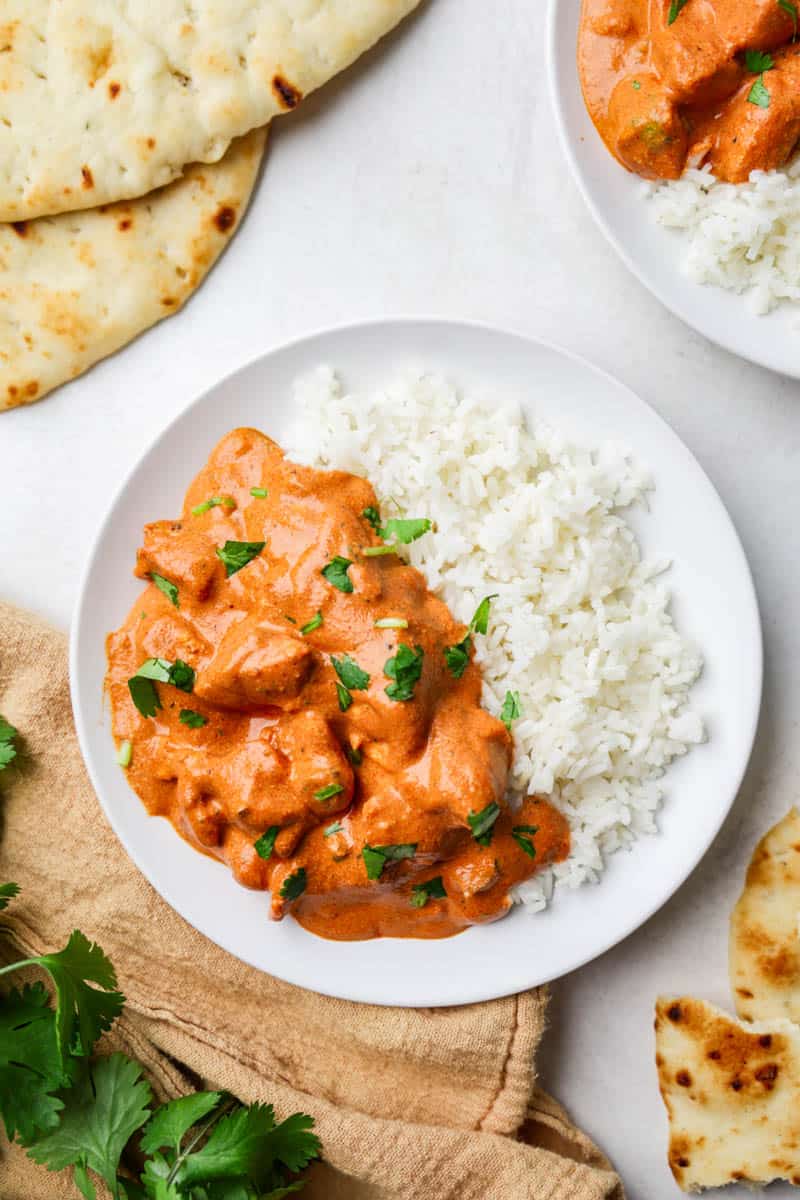
When is chicken tikka masala ready?
- Chicken should be fully cooked, with no pink inside, and juices running clear.
- The sauce should be thick and creamy, not watery.
- Aromatic spices should give off a rich, inviting smell.
Storage, Freezing & Reheating Instructions
- Refrigerate leftovers in an airtight container for up to 4 days
- Reheat on the stove or in the microwave, adding a splash of water if needed.
We do not recommend freezing this dish due to the heavy whipping cream. Dairy tends to separate from the rest of the ingredients when thawed, resulting in an unpleasant texture.
More South Asian-Inspired Recipes
Homemade Naan
2 hrs
Watch the video below where Rachel will walk you through every step of this recipe. Sometimes it helps to have a visual, and we’ve always got you covered with our cooking show. You can find the complete collection of recipes on YouTube, Facebook Watch, or our Facebook Page, or right here on our website with their corresponding recipes.

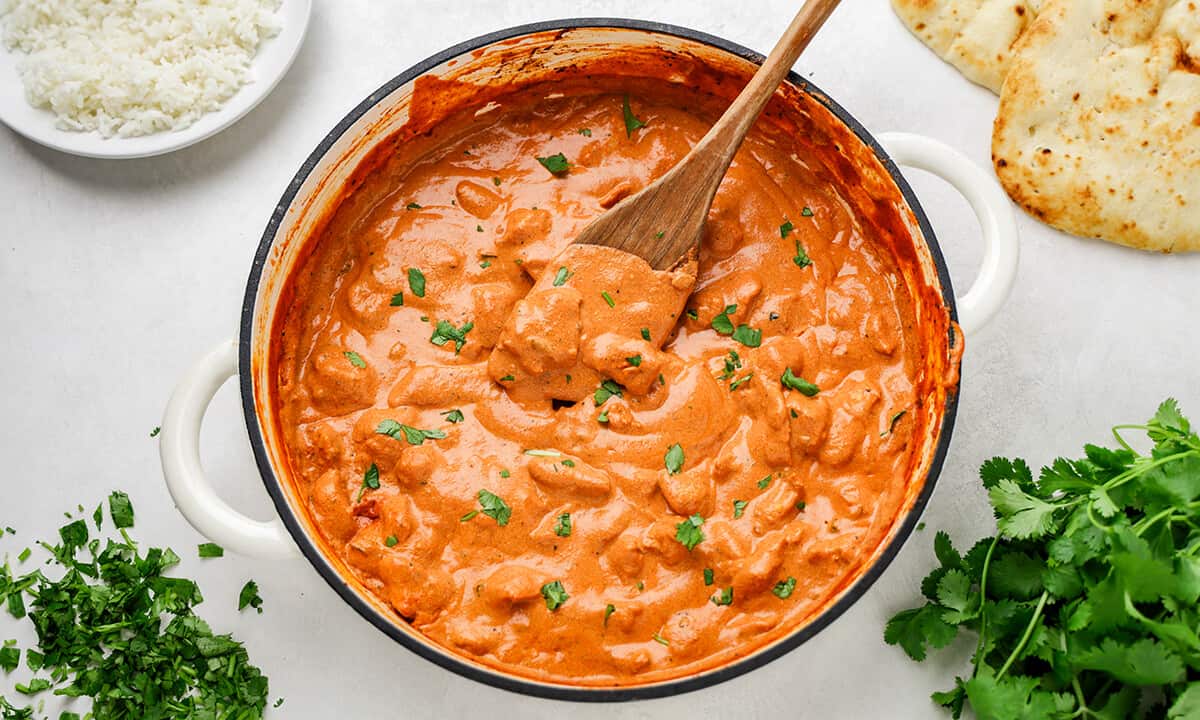
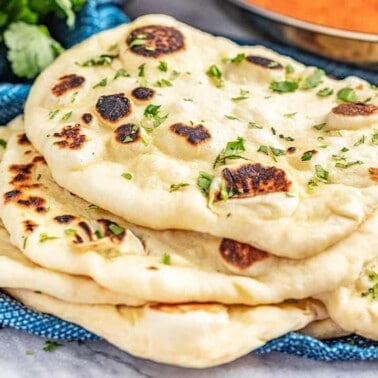
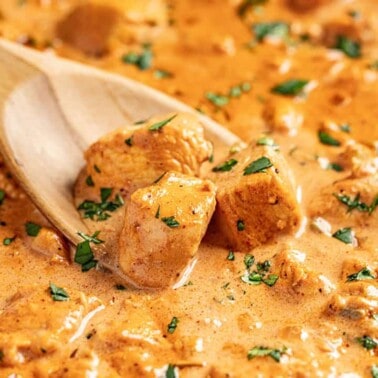
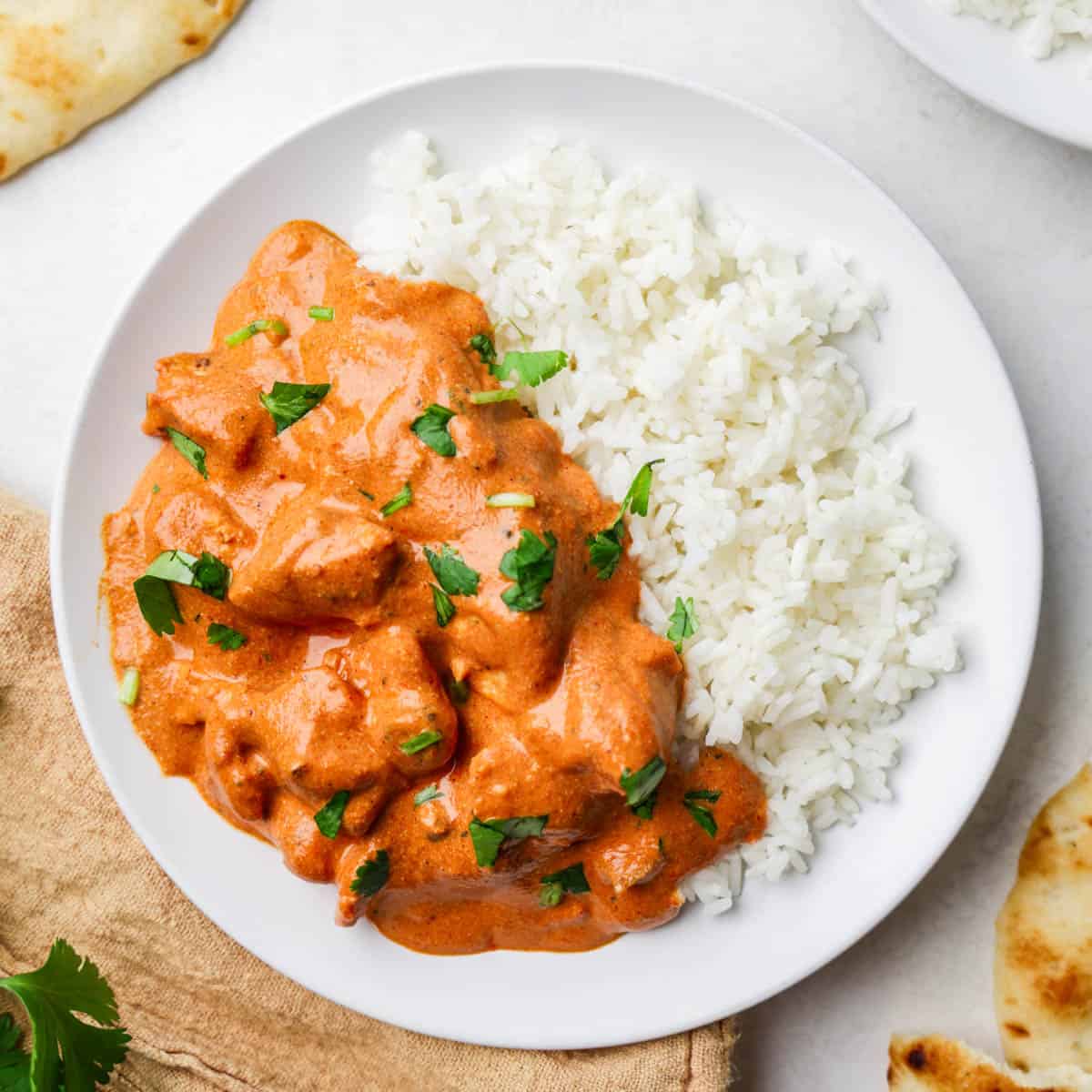
I made chicken Tikka masala for the first time and I will continue to make it! It was really delicious! My husband and son loved it. I did not use jalapeno since I didn’t have any. I found it a little spicy though, but a good spice. Thank you for introducing us to these lovely flavors. I have made your butter chicken before with excellent results as well! Thank you!
Fantastic recipe! My family of 3 loves this. It makes a lot and fed us for 2 days. I served it over jasmine rice.
Love your recipes! Thank you for sharing.
One of the best dishes I ever cooked.. Even if spicy all of my family loved it.. Included kids
Can I use boneless skinless chicken thighs? They have soooo much more flavor. I detest chicken tit. That being said, how many thighs or pounds should I use? Chicken breasts like human, highly variable in size and weight. Just sayin.
Like you Martha, I do not like breast of chicken in cooked dishes ( except chicken salad).. My Indian place will substitute much tastier. thighs always. Soooo much tastier!